12 months, 12 lives: Kashmiris in limbo and lockdown
On 5 August 2019, the Indian government stripped Kashmir of its constitutionally guaranteed special status and split the region into two federally-run territories. A stringent curfew was imposed and thousands detained along with a communications black-out.
The lockdown began to be eased in March, but was then re-imposed due to the Covid-19 pandemic. It has been a year of shutdowns, anger and fear. The BBC spoke to 12 different Kashmiris, to find out what their lives have been like during this year.
Sanna Irshad Mattoo, 26
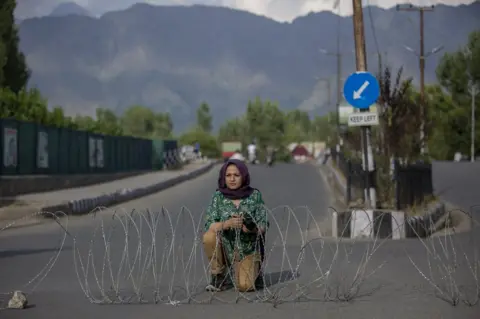 BBC
BBC"In our line of work, you can't separate the personal from the professional," says Ms Mattoo, who has been a journalist for the last four years.
"We have been through lockdowns in previous years. But last year there was an environment of fear psychosis. We didn't know what was happening. Our modes of communication changed. We innovated to be heard."
Ms Mattoo said that security personnel attitudes towards reporters - already quite hostile - hardened further after August.
"Now journalists are questioned, arrested and forced to reveal sources. If I have to put up a post on social media, I have to think twice or thrice now because I have to work too. The fear is always there."
"There is a degree of concern for me at home. But I don't share my professional work with my family. I don't discuss it with them. Sometimes one has to lie as well."
Altaf Hussain, 55
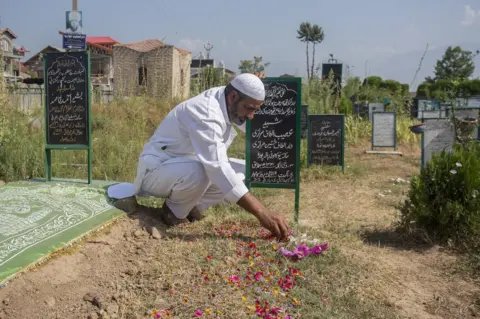 BBC
BBCAltaf Hussain's son was one of the first casualties post the government order on 5 August.
Usaib Altaf, 17, drowned after he jumped into a river to escape security forces who were chasing him - a charge they have denied.
A year later, his death has still not been officially acknowledged - even the hospital where he died has refused to issue the family with a death certificate.
"He had gone to play football but he returned in a coffin. Police insist no-one died that day. They are not acknowledging that he was killed. I have witnesses but still they are refusing to file a case. We went to the police station and courts but there's been no justice," he says.
Muneefa Nazir, 6
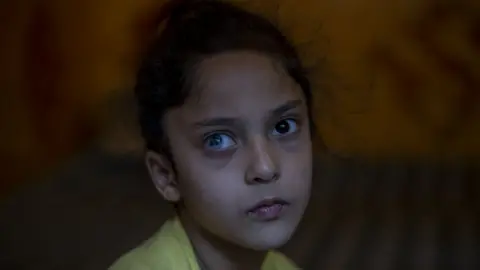 BBC
BBCMuneefa was caught in the crossfire after a protest broke out between protesters and security forces.
She was hit in the right eye, apparently with a slingshot.
"I was in hospital for many days. But I don't remember much now. I have forgotten my school lessons. I used to get 100 out of 100 marks. Once my eye is cured, I want to become a doctor. I like doctors because they helped me get well," she says.
Her father, who is a cameraman for a local news agency, says her eye is completely gone and he had to take her out of school after he could no longer afford to pay the fees.
"I can only see shadows. I can't read books. I don't go anywhere. Doctors said I will be able to go to school after 15 days but a year has passed," she says.
Farooq Ahmad, 34
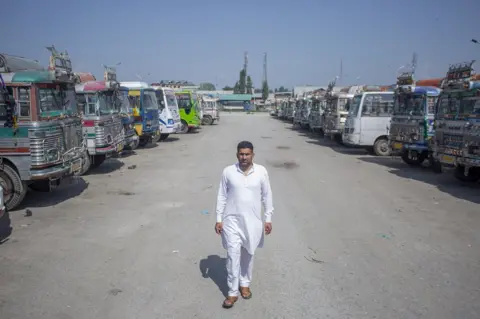 BBC
BBCMr Ahmed has a typical rags-to-riches story.
He started working while he was still a young boy, helping drivers at a bus yard in Srinagar, the capital of Indian-administered Kashmir.
In 2003, with his wife's gold ornaments and his own savings, he purchased a bus of his own.
Today, along with a partner and a bank loan, he has a fleet of seven buses - but all of them are grounded. Transport has been one of the worst hit sectors in the region this year.
"Recently we renewed the insurance policies of these buses for around 400,000 rupees ($5,335; £4,380) without earning a cent. Seven of my employees are on the verge of starvation. But how am I supposed to take care of their families when my own family is suffering? People like me sold our precious assets to make a respectable livelihood - when we don't earn, how will we repay our debts?
Mr Ahmed now works as a manual labourer to try and pay off his back loan.
Iqra Ahmad, 28
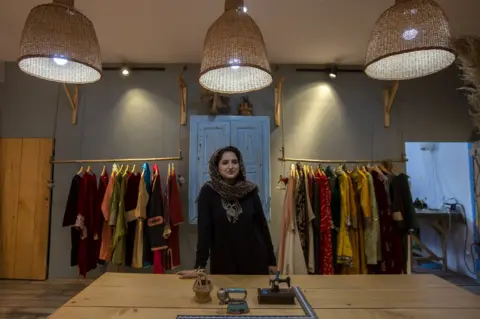 BBC
BBCMs Ahmad runs her own fashion designing business - a career choice she made she says, because she didn't want anyone bossing her around.
She says she wants to promote Kashmiri culture through her work - which she sells online.
"The internet shutdown inflicted a big blow to my business and 2G hasn't been helpful. I have customers all over the world including the US, Dubai and Australia.
But most of my customers are Kashmiri and they can't see my products because pictures don't open on 2G speed. Earlier, I used to get 100-110 orders a week. Now I only get about five or six.
International customers worry over delayed orders. One recently contacted her to congratulate her for delivering her order after six months. Another asked her to "get lost" because she didn't reply to her text on time due to the internet shutdown.
"I don't think I can sustain my business for long like this. My monthly expenses are close to 200,000 rupees. And if I don't earn anything, how will I pay my seven workers?"
Badrud Duja, 24
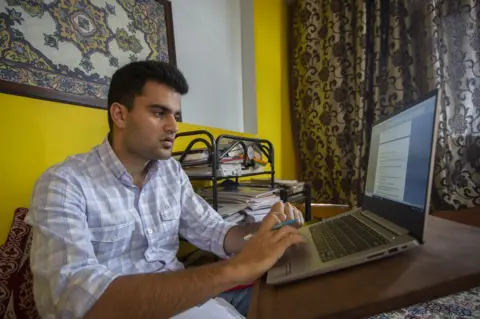 BBC
BBC"As a law student, I study the constitution, spirit of democracy, fundamental rights, and due process of law. But these are merely words. The castle they build is crumbling. We are losing individual liberties. For all students and teachers, studying law has become a joke."
Mr Dujia is fast becoming disillusioned with his chosen profession.
"Speaking used to be a remedy but now it can land you in jail. As an intern with a human rights advocacy group in Kashmir, I saw a man bundled into a police van for speaking with media. Our spirit is being destroyed. There is complete hopelessness. We didn't study law to see it damaged by those who are paid to uphold it. I am searching for a different job."
Manzoor Bhat, 29
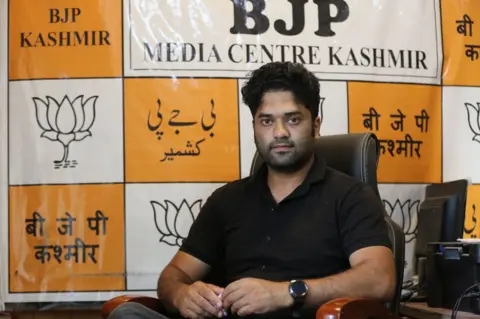 BBC
BBCMr Bhatt heads the media wing of India's ruling Hindu-nationalist Bharatiya Janata Party (BJP) - which abrogated the erstwhile state's special status.
He says he has been ostracised by his friends and family for choosing to join the party, but insists he will "not go to hell" because of it. To the contrary, he feels that he is helping the people of the region.
"My aim is not power or earning money but changing the lives of others. Our youngsters pick up guns but this is not a solution. Those who die in Kashmir are my brothers too - but violence is not the answer."
Javed Ahmad, 35
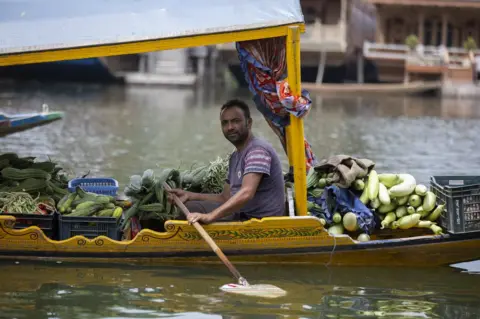 BBC
BBCMr Ahmed worked as a boat operator on the picturesque Dal Lake in Srinagar for the last 25 years, ferrying tourists up and down. It was a lucrative enough livelihood - he would earn around 500 rupees a day.
"Now, I am forced to sell vegetables to survive - but where are the customers in a lockdown?" he asks.
He says he struggles to pay even his children's school fees.
"Our future has been ruined. Tourists won't come because of fear. This is a difficult time for everyone in Kashmir. But the tourism sector has suffered the most."
Mr Ahmad says the government has promised boatmen 1,000 rupees each but says that won't even help pay his electricity bill.
"I have left it to God because I have no hope."
Falah Shah, 12
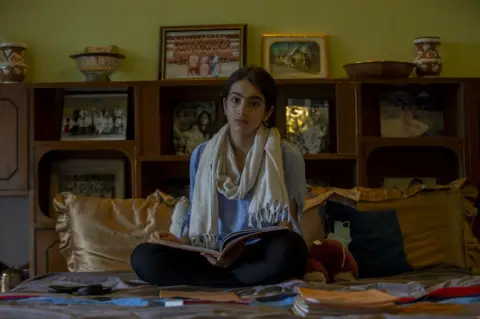 BBC
BBC"In the rest of India, students have the best education opportunities. I am at a level where I am being deprived of even a basic education. If we miss out on important concepts at this point, how will we pass competitive exams in the future?" Falah asks.
"I am facing problems with basic concepts in science and mathematics. But with the internet cut, I couldn't even search for solutions. Now the internet is back but speeds are terrible. Even if I try to open a book and read, there is no use because I have no concepts to begin with."
She says she misses school - her teachers and friends.
"I don't leave my home. For one year, I have been confined to this place. If any other state had been under lockdown for a year, students would have come out and protested. They wouldn't stay home. But we can't protest. We can be jailed."
Sajid Farooq, 43
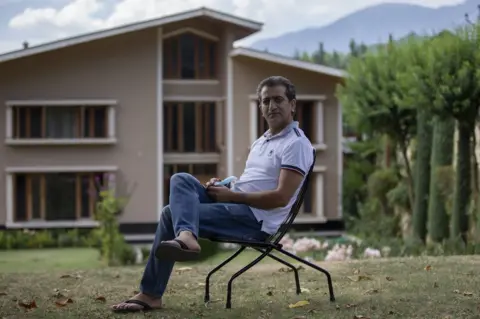 BBC
BBCMr Farooq is a hotelier and a third-generation businessman but says he sees no future in Kashmir.
He talks about the death and violence he has seen since 1990 - the beginning of a militant uprising against Indian rule in the state.
"It took three generations to build this hotel. But since 1990, we have only been surviving."
Business, he says, has become unsustainable.
"For electricity, I have to pay 200,000 rupees whether my hotel uses it or not. There are other service charges. I don't see things getting better. What Kashmiris mourn, the rest of the country celebrates. What the rest of country celebrates, we mourn it. So everything has become political. In everything, there is conflict. In such a situation, how can businesses run?"
Bilal Ahmad, 35
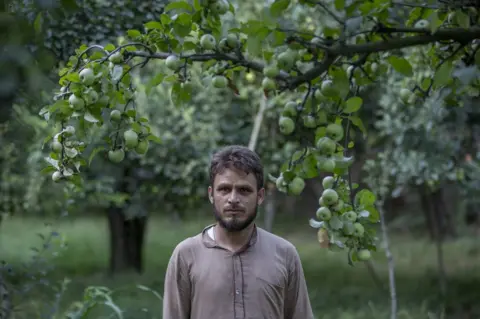 BBC
BBCMr Ahmed is a fruit farmer in Kashmir - one of the main sources of agricultural revenue in the region.
He says a combination of unseasonal weather and the lockdown has landed him in a situation where he may have to even sell his land.
Unexpectedly early snowfall damaged both his apple and peach trees, and then to add to his woes, a shortage of labour meant that he could not spray his crops, which led to a poor harvest.
"We have been idle for a year now. The apple produce used to fetch between 100,000 and 150,000 rupees but this year I have made only 30,000 rupees. My brother harvested 1,200 boxes of peaches but he had to throw away most of them because there were no buyers. If the situation continues like this, I may be forced to sell off the land - I can't do any other work. I have not studied much."
Mohammad Sidiq, 49
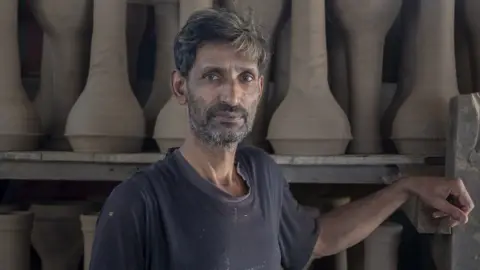 BBC
BBCMr Sidiq works in pottery but says his work has ground to a halt because he can't get his raw material.
The state government recently handed out sand and rock extraction permits to non-local contractors, putting thousands of locals like Mr Sidiq out of work.
"The government has banned soil extraction. They say there are court orders. But where were the courts all these years? Did the judges not give a thought about the families of poor men like us? Do they want to starve us to death? Due to the lockdown, all of my products are unsold, I have stopped making new products and instead work as a manual labourer."
Pictures by Abid Bhat. Reporting by Jehangir Ali
